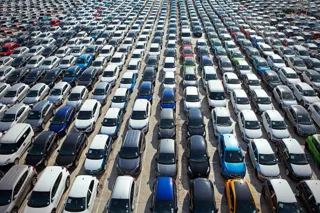A dip in driver confidence and satisfaction with the leasing sector is being blamed on supply issues caused by WLTP.
The new emissions testing regime – the Worldwide Harmonised Light Vehicle Test Procedure (WLTP) – was introduced in September 2018.
At the time, Fleet News reported how manufacturers had suffered a 20.5% decline in new car registrations as challenges surrounding the implementation of newly-introduced WLTP emissions standards meant they simply had no cars to sell.
Vehicles that failed to meet the new standards by the September deadline could not be registered, and production lines had to adapt to produce modified or new engines in order to comply.
Some model variants were ditched altogether, such as the BMW 520d Efficient Dynamics, while others were taken off sale temporarily like the Volkswagen Golf GTE.
September is a plate-change month – one of the busiest times of the year– but 87,000 fewer cars were registered than in 2017 and fleet registrations were even lower, with a 22.4% decline.
Results from the 2019 APD Business Driver Sentiment Report now show how that hit fleet satisfaction levels.
Analysis of data it collected from 54,027 individual business driver surveys across eight different event types (service or repair; delivery; order; accident; tyre; rental; breakdown; and glass) revealed that while overall customer satisfaction (CSAT) remained unchanged at 84%, net promoter score (NPS) was down from 56 in 2018 to 53 in 2019.
The adverse scoring in the ‘order’ event type proved to be the biggest influencer on the results during 2019 and, despite fluctuations in the remaining seven categories, dragged the overall results down for the third year in a row.
A deeper analysis into drivers’ verbatim comments using APD’s sentiment analytics tool identified that, according to drivers, there had been a breakdown in accurate communication of the implications of the WLTP changes in advance and in many cases where they impacted on an order already in progress.
Slight downturns in NPS were felt across a further five areas: service or repair; delivery; accident; tyre; and rental, with glass retaining its previous year’s value (73). Meanwhile, breakdown proved to be the shining light, up on by four points on 2018 to 49.
 Despite the falls in sentiment values year-on-year, the NPS ratings in all but one (orders) of the eight category scores were over 50. APD says that this should be viewed within the context of an overall decline in NPS scores across mobility industry sectors and that when measured against global NPS standards, any score of 50 and above are classed as ‘excellent’, while 70 and above is considered ‘world class’.
Despite the falls in sentiment values year-on-year, the NPS ratings in all but one (orders) of the eight category scores were over 50. APD says that this should be viewed within the context of an overall decline in NPS scores across mobility industry sectors and that when measured against global NPS standards, any score of 50 and above are classed as ‘excellent’, while 70 and above is considered ‘world class’.
While NPS scores declined, CSAT feedback fared more favourably year-on-year with feedback improvements in delivery; tyre; and glass, while breakdown remained static. Service and repair; accident; and rental all saw reductions in satisfaction levels. All events, with the exception of orders, remained in excess of 80%.
 Paul Turner, executive chairman of APD Global, said: “WLTP clearly had a major impact on vehicle leasing customer sentiment in 2019 and its introduction was something beyond the leasing companies controls. However, whilst this is true, some leasing companies approach to communicating the implications of the changes to customers and their drivers fell short of expectations.”
Paul Turner, executive chairman of APD Global, said: “WLTP clearly had a major impact on vehicle leasing customer sentiment in 2019 and its introduction was something beyond the leasing companies controls. However, whilst this is true, some leasing companies approach to communicating the implications of the changes to customers and their drivers fell short of expectations.”
With regards to both measures – NPS and CSAT – ‘orders’ proved to be the only feedback set which dipped below what proved to be another very strong set of results from across the sector.
Turner continued: “It is accurate to say the leasing sector continues to perform highly yet there are, without doubt, areas which require attention having slipped across both customer feedback metrics for the past two years – namely service or repair; accident; and rental. These are areas, according to driver, that need to be addressed.
“The evidence is there for leasing companies to act upon. As the sector gears up and navigates its way through the complexities caused by the Coronavirus, it will be these seemingly small things which really start to shape the fortunes of vehicle providers.”























Login to comment
Comments
No comments have been made yet.